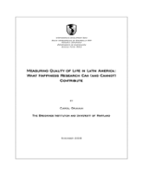Measuring Quality of Life in Latin America: What Happiness Research Can (and Cannot) Contribute
Date
Nov 2008
This paper addresses the issues involved in taking a broader, quality of life-based approach rather than an income-based approach to assessing welfare. Te paper shows how a quality of life approach can help to evaluate the welfare effects of factors ranging from health, education, and unemployment to institutional arrangements such as inequality and opportunity. Nonetheless, directly inferring policy implications is problematic because norms and expectations influence the way in which individuals respond to surveys and the definition of happiness is unclear. The latter allows for research comparisons across individuals and cultures but presents challenges as a basis for policymaking.



